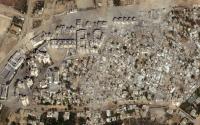7 October 2004Rupert Cornwell in Washington, Ben Russell in Khartoum and Anne Penketh
Destroying the Bush administration's main rationale for war against Iraq, the chief US weapons inspector declared yesterday that Saddam Hussein had neither weapons of mass destruction nor programmes to manufacture them at short notice when the US and its allies invaded in March 2003.
Charles Duelfer told the Senate Armed Services Committee he did not believe that "militarily significant" WMD stockpiles were hidden in Iraq.
He also said that Iraq's nuclear programme was nothing compared to what it had been in 1991, at the time of the previous invasion and amounted to less even than in 1998, when the United Nations weapons inspectors were withdrawn.
Tony Blair sought to minimise the damning conclusion of the report, saying: "This case is a far more complicated situation than many people thought.
"Just as I accept that the evidence now is that there were no stockpiles of actual weapons ready to be deployed, others can be honest and accept that the report also shows that sanctions were not working.
"On the contrary, Saddam Hussein was doing the best to get around those sanctions, with every intention of developing those programmes of weapons of mass destruction ... and there were multiple breaches of the United Nations resolutions, which were the legal justification for the conflict."
The report states that the Iraq Survey Group (ISG) "has not found evidence that Saddam Hussein possessed WMD in 2003", but left open the possibility that some weapons existed in Iraq, "although not of a militarily significant capability".
Before the invasion, US Vice-President Dick Cheney even alleged that the Iraqi dictator was "reconstituting" nuclear weapons. But Mr Duelfer dismissed that thesis.
Despite Saddam's attempt to retain some parts of the programme after 1991, "during the following 12 years, Iraq's ability to produce a weapon decayed".
Mr Duelfer was introducing the ISG's 1,000-plus page report, based on visits to suspect sites, the examination of thousands of pages of documents and interviews with former Iraqi officials involved in weapons programmes. Moreover, it found no evidence that Saddam had secretly transferred weapons or components to Syria.
Saddam is said to have told interrogators that his previous possession and use of chemical and biological weapons was a key reason why he stayed in power. WMD enabled him halt Iranian attacks in the 1980-1988 Iran/Iraq war, and deterred the US and its allies from marching on Baghdad in 1991.
However, Mr Duelfer did say that only timely Allied action this year had prevented chemical weapons experts from Saddam's regime from linking up with insurgents in Iraq.
He warned that lethal skills developed by Iraqi scientists "could be transferred to other hands". With WMD proven to be a fiction, and increasing doubts about ties between his regime and Osama bin Laden's al-Qa'ida, the risk of proliferation of WMD expertise has become the White House's main argument in defence of the invasion.
After 11 September 2001, Mr Bush said yesterday, the US had to go after sources of weapons for terrorist groups. "We had to take a hard look at every place where terrorists might get those weapons," he said. "One regime stood out - the dictatorship of Saddam Hussein." According to US officials, ISG investigators found that Iraq had had plans for missiles with ranges of up to 1,000km, far greater than the 150km maximum imposed by the UN.
But Mr Duelfer said that "while Saddam wanted a long-range missile, little work had been done on warheads".
Questioned by Senator Carl Levin, a Michigan Democrat, Mr Duelfer conceded that aluminum tubes bought by Saddam and once suspected of being used for enriching uranium to make a nuclear device were probably intended for conventional rockets.
Nor was there evidence that Iraq sought uranium abroad after 1991. Both statements contradict claims by top US officials before the war. Mr Bush himself contended, in his 2003 State of the Union message, that Iraq had tried to buy yellow-cake uranium in Africa.
"So not only did he not have weapons, he chose not to have them," said Mr Levin. "That's 180 degrees different from what the Bush administration said."
Saddam apparently stopped development because further components could only be obtained once UN sanctions were lifted.
He had been doing his best to wriggle free of sanctions through illegal financial and procurement schemes, the report states. Indeed, it lists foreign companies that violated the UN sanctions, many of them reportedly coming from the US, as well as France, Russia, China and Poland.
REACTION TO THE REPORT
Jeremy Corbyn Labour MP for Islington North
"Hans Blix was denied time to go back in to Iraq 19 months ago. Since then, many thousands have died allegedly in a war for WMDs and we now have confirmation for the illegal occupying forces that there are no such weapons. Those that supported the war should hang their heads in shame. I look forward to Tony Blair being put to close scrutiny in Parliament about this next week."
Greg Dyke, former BBC director general
"I don't think there was anyone who thought otherwise. I am sure it comes as no surprise. There are many questions that remain unanswered about the British Government's use of intelligece, claims arising out of the Butler report, in particular who removed the caveats on the intelligence ... I suspect we shall never get full answers to these questions."
Nicholas Soames, shadow Defence Secretary
"I don't think it alters the case for war one way or another personally, but I think it is difficult for the Americans and for the Prime Minister to explain."
Scott McClellan, White House spokesman
"[The report concludes] that Saddam Hussein had the intent and the capability, that he was pursuing an aggressive strategy to bring down the sanctions, the international sanctions, imposed by the United Nations through illegal financing procurement schemes. The report will continue to show that he was a gathering threat that needed to be taken seriously, that it was a matter of time before he was going to begin pursuing those weapons of mass destruction."
Louise Christian, human rights lawyer representing British prisoners in Guantanamo Bay
"This means that had Hans Blix been allowed to stay and complete his task, the war would not have happened. Lots of people, including myself, think Saddam Hussein should have been removed but I do not think we needed a war with all its civilian deaths. The US had already decided to go to war to complete what happened in 1992, or so they saw it, so the war was a psychological need on the part of the presidency. Both the US and UK have got to be accountable for waging an illegal war. They have brought international law into disrepute, undermined the authority of the UN and committed war crimes."
Anthony Scrivener QC, former chair of the Bar
"I have always taken the view that the war was illegal and this confirms what I felt from day one, and what has been gradually creeping out in bits by various ministers. Now it has been confirmed by an independent report. I feel now that Tony Blair's credibility has been shot to bits."
Michael Howard, the Conservative leader
"I think the world is a safer place without Saddam Hussein. I also think it is very important to tell the country the truth. Although I think it was right to go to war, I don't think the Prime Minister told us the truth about the intelligence he had received."
Reg Keys, whose son Lance Cpl Thomas Keys, 20, was one of six Military Police killed by a mob of Iraqis
"The Prime Minister fed us a pack of lies. He told us we were going to war to defend our shores from a WMD strike. My son was told he was going off to fight a country that was threatening to use WMD. Now we know he was lied to."
Louise Ellman, Labour MP for Liverpool Riverside
"I don't think the findings of this report make a great deal of difference at this stage. The survey group also found that Saddam was planning to start producing weapons again once sanctions had been removed. I stand by Tony Blair's position to go to war."
Ann Clwyd, Labour MP for Cynon Valley and Tony Blair's special representative in Iraq
"That (WMD) was never my argument. I always believed that the regime of Saddam Hussein had to be tackled on human rights grounds because of the hundreds of thousands of people who died in the prisons, disappeared or were tortured. I had campaigned for 25 years and knew more than most about what was going on in Iraq. So when the decision was finally made to go to war, obviously I supported the Government."
Iqbal Sacranie, Secretary general of the Muslim Council of Britain
"These findings are not a great surprise. Robin Cook in his masterly resignation speech on the eve of war had practically said as much. Today's official pronouncement will serve to give added conviction to the tens of millions in the Muslim world who believe that senior figures in the Bush administration misled us about the true aims of the war. Clearly this administration is intent on the economic and military domination of the heartlands of Islam. It is a recipe for disaster."
Rose Gentle, mother of fusilier Gordon Gentle who was killed in Iraq
"Tony Blair knew there was no WMD but he just agreed with George Bush. He has basically sent young kids to be killed for nothing."He said he wanted to make it a safer place but it is not. Young innocent Iraqis are getting killed over there as well. I think Tony Blair should resign."
Paul Bigley, whose brother Ken has been a hostage in Iraq for three weeks
"The war is illegal. It was based on ill-founded information and ill judgement. Tony Blair apologised but that is not enough. You do not make mistakes of this calibre and just get away with it. There are people being killed out there. It is time we had a mechanism in place for withdrawal."
Robin Cook, Former Foreign Secretary
"It establishes that Iraq had no stockpile, no biological agents, no chemical feedstocks, no plants to manufacture them and no delivery systems to fire them. Saddam was no threat to us and had no weapons of mass destruction to pass to terrorists. Brushing the UN inspectors aside in order to go to war on false intelligence was a colossal blunder."
Tobias Ellwood, prospective Tory candidate for Bourne-mouth East. Brother Jon killed by the Bali bomb
"I don't believe we were right to go to war and we have taken our eye away from the real problems of terrorism, in fact we have compounded them by opening up a new front. I have no doubt Saddam Hussein had to be dealt with some way but was very uncomfortable we didn't go with UN support, thus alienating a lot of countries, particularly Muslim countries who would otherwise have contributed to rebuilding Iraq."
http://news.independent.co.uk/low_res/story.jsp?story=569584&host=3&dir=70






